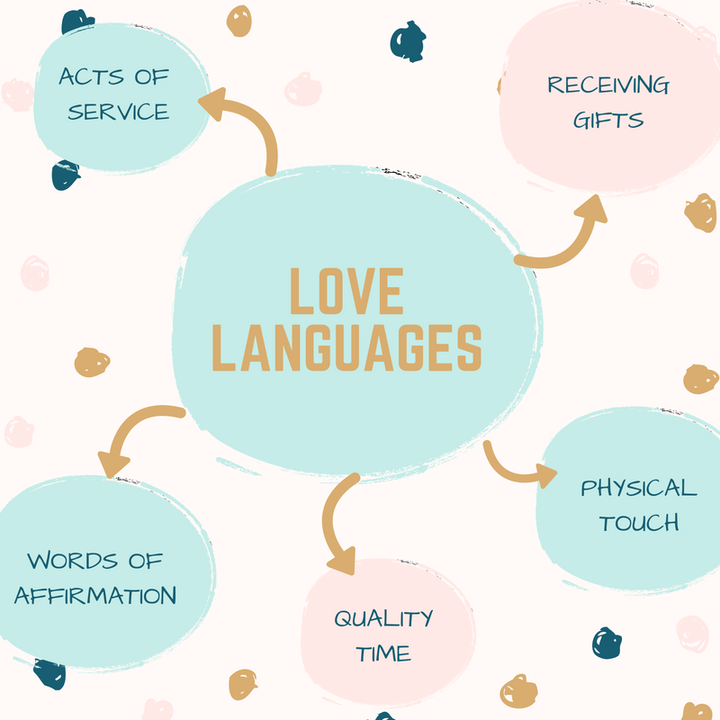Understanding Your Love Language
How do you give and receive love? Have you ever thought about it?
In 1992 Gary Chapman published his book, The Five Love Languages: How to Express Heartfelt Commitment to Your Mate, where he describes the different ways that people give, receive, and interpret love. I know the title may sound a little bizarre, but there’s truth to it; hear me out. While Chapman focuses primarily on exchanges of affection and affirmation in romantic relationships, the principles he outlines apply to all types: platonic, familial, etc. By familiarizing yourself with how you engage with others, you can hone the communication skills necessary to facilitate healthy and cohesive relationships. There is a difference between caring about an individual and showing that an individual how much you care. Sometimes, this phenomenon can be the decider in whether or not the relationship will last.
Chapman went on to develop a quiz that would help people identify and learn from their primary love language. I pasted it at the bottom of the article. Happy self-discovering!
Words of Affirmation
If your love language is “words of affirmation,” you tend to value verbal and written acknowledgments of affection. These include but are not limited to: compliments, verbal encouragement, notes or handwritten cards, and frequent texting or conversation. You feel loved when someone takes the time to positively acknowledge something you’re doing or goes out of their way to talk to you. You may find yourself craving reassurance from time to time, which is natural for people who exhibit this love language. Maintain consciousness over how often you ask for someone’s affirmation because some people misinterpret this need as distrust in them. With that said, keep doing you!
Quality Time
If quality time is your love language, you feel the most loved when someone actively wants to spend time with you. You have a particular fondness for active listening, eye contact, and people being fully present when you spend time together. Spending uninterrupted alone time with people makes you feel close to them because you can enjoy each other’s presence with undivided attention. No distractions, please, and thanks. It’s meaningful when someone carves time out of their schedule for you and rarely cancels plans. Creating memories and special moments together, trying new things, and sharing new experiences all mean the world to you in terms of your relationships.
Acts of Service
If your love language is acts of service, you value someone going out of their way to make your life easier. It’s things like bringing you soup when you’re sick, making your coffee for you in the morning, or running an errand for you when you’ve had a long day. They say that actions speak louder than words; you need someone to show you that you can really rely on them, not just tell you. It’s the little things though which matter the most. It’s not about grand gestures. You appreciate when someone picks up on the fact that you’re stressed or tired and views it as an opportunity to take something off your plate that’s easy for them to do. That small act helps you feel taken care of.
Gifts
People whose love language is “gifts” feel loved when people give them visual symbols of love. It’s not about their monetary value; gifts with a deep personal meaning behind them are what make you feel warm. People with this love language derive value from the gift-giving process: the deliberate choice of the object that will resonate with the recipient, the reflection and intimacy, and the emotional benefits from receiving the present. The gift becomes a tangible reminder of the person that gave it to you, which fills you with love. After a trip or any occasion, you appreciate taking a memento or souvenir home with you because the item reminds you of those memories.
Touch
People with physical touch as their love language feel loved when they exchange physical signs of affection, such as hugging, holding hands, cuddling, etc. Physical intimacy can be incredibly affirming and serve as an emotional tether for people with this love language. The roots go back to one’s childhood; some people only felt deep affection and love from their parents when they were held, kissed, or touched. Consistent physical affection makes you feel grounded, so you aren’t hesitant to hold hands, give and receive long hugs, and sit close together. You can feel how you want about PDA, but you let your walls down when you’re alone. If someone you care about and are comfortable with is sitting next to you, you would rather sit side-to-side and cuddle up to them than have space in between you. It’s almost instinct when you reach out to touch someone’s arm, play with their hair, or hold their hand.
Here is the link to the official love language quiz:)
http://the official quiz: https://www.5lovelanguages.com/quizzes/








